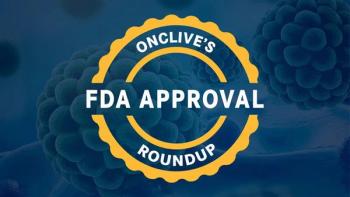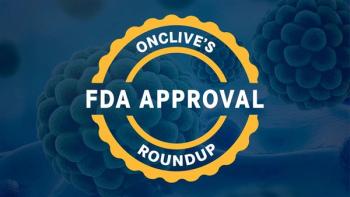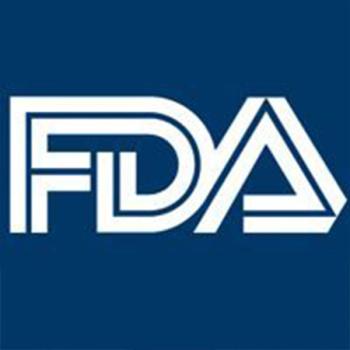
FDA Approvals in GBM, Biosimilar in Breast Cancer and Gastric/GEJ Cancer, and Biomarker Assay
Today-
FDA approvals in glioblastoma, a biosimilar across several tumor types, and a cancer biomarker assay, priority reviews in ovarian cancer and cutaneous T-cell lymphoma, and clinical holds lifted on multiple myeloma trials.
Welcome to OncLive News Network! I’m Gina Columbus.
In glioblastoma, the FDA granted bevacizumab a full approval for the treatment of adult patients who progressed following prior therapy.
Bevacizumab previously received an accelerated approval in this setting. The conversion to a full approval is based on data from the multicenter, randomized, open-label phase III EORTC 26101 study, in which adding bevacizumab to lomustine chemotherapy reduced the risk of disease progression or death by 48%.
Additional findings showed that there was not a significant increase in overall survival with the addition of bevacizumab. However, the combination did result in a median PFS of 4.2 months versus 1.5 months with lomustine alone.
*****************************************
The FDA has approved the trastuzumab biosimilar MYL-1401O, now known by the trade name Ogivri.
The approved indications are for HER2-positive patients with breast cancer or metastatic gastric or gastroesophageal junction adenocarcinoma, which are the same indications as trastuzumab. Genentech, the manufacturer of trastuzumab, holds an exclusive license for the metastatic gastric cancer indication, meaning that the drug cannot be marketed for that purpose until the exclusive license expires.
Mylan and Biocon, the developers of the biosimilar, submitted a biologics license application to the FDA for the agent in November 2016. The following year, in July, the FDA’s Oncologic Drugs Advisory Committee voted 16 to 0 to recommend approval of MYL-1401O. However, on August 30, the FDA announced that it had extended its decision deadline on the BLA by 3 months.
The application includes phase III findings from HERiTAge, a 2-part, multicenter, double-blind, randomized, parallel-group study. Results showed that the overall response rate after 24 weeks was 69.6% among women who received the biosimilar plus a taxane compared with a 64% ORR for patients who received trastuzumab plus a taxane.
*****************************************
The FDA has approved the FoundationOne CDx cancer biomarker assay concurrently with a decision from the Centers for Medicare and Medicaid Services to provide insurance coverage for the next-generation sequencing-based in vitro diagnostic test.
F1CDx, which detects 324 different genes, is said to be a more extensive assay that can identify actionable mutations across 5 tumor types for 15 different targeted therapies. Additionally, the test can detect microsatellite instability and tumor mutational burden, which have been associated with response to immunotherapy. In clinical trial results, F1CDx could accurately detect substitutions, short insertions, and deletions approximately 94.6% of the time for each of the 324 genes.
The agency said the test can be used as a companion diagnostic to identify specific mutations for non—small cell lung cancer, melanoma, breast cancer, colorectal cancer, or ovarian cancer.
The F1CDx can detect genetic mutations that are indicated for multiple treatments. Among the 324 genes, the F1CDx assay can detect alterations in EGFR, KRAS, BRAF, BRCA1/2, ALK, and several other genes with emerging therapeutics, such as NTRK1/2/3.
******************************
In gynecologic cancer, the FDA has granted a priority review to a supplemental new drug application for rucaparib for use as a maintenance treatment for patients with recurrent epithelial ovarian, fallopian tube, or primary peritoneal cancer who are in a complete or partial response to platinum-based chemotherapy.
The application is based on results from the phase III ARIEL3 trial, in which maintenance rucaparib was found to improve median progression-free survival by 11.2 months versus placebo for patients with BRCA-mutant platinum-sensitive ovarian cancer.
Moreover, for patients with germline or somatic BRCA mutations, there was a 77% reduction in the risk of progression or death with rucaparib versus placebo. The median PFS with rucaparib was 16.6 months compared with 5.4 months for placebo. Similar PFS benefits were observed in patients with BRCA wild-type tumors and those with homologous recombination deficiency or low to high loss of heterozygosity.
Under the Prescription Drug User Fee Act, the FDA is scheduled to make its decision on the application by April 6, 2018.
**************************************
In cutaneous T-cell lymphoma, the FDA granted a priority review to a biologics license application for mogamulizumab for the treatment of patients who have received at least 1 prior systemic therapy.
The BLA is based on results from the phase III MAVORIC study, which are scheduled to be presented at the upcoming 2017 ASH Annual Meeting. According to the study abstract published online ahead of the meeting, mogamulizumab reduced the risk of progression or death by 47% versus vorinostat in previously treated patients with CTCL.
Additional findings showed that the investigator-assessed median progression-free survival was 7.7 months in the mogamulizumab arm versus 3.1 months in the vorinostat arm. By independent review, the median PFS was 6.7 versus 3.8 months, respectively. The PFS benefit with the anti-CCR4 monoclonal antibody was observed across predefined subgroups.
Under the Prescription Drug User Fee Act, the FDA is scheduled to make its final decision on the application on or before June 4, 2018.
**************************************
The FDA has lifted partial clinical holds that were placed on the phase I CheckMate-039 and phase II CA204142 trials exploring nivolumab-based regimens in patients with relapsed/refractory multiple myeloma.
The agency placed the partial holds on the studies in October 2017, along with a third study, the phase III CheckMate-602 trial, which was also examining a nivolumab combination in myeloma. The partial hold on this study, which was evaluating combinations of nivolumab, elotuzumab, pomalidomide, and dexamethasone for patients with relapsed/refractory disease, remains in place.
The holds on the phase I and II trials were lifted and patient enrollment has resumed following an agreement between the company and the FDA on amendments to the study protocols.
Previously, the FDA placed the holds based on safety concerns identified in 2 clinical trials evaluating another PD-1 inhibitor, pembrolizumab, in combination with dexamethasone and lenalidomide or pomalidomide for the treatment of patients with multiple myeloma.
The agency ordered discontinuation of the pembrolizumab trials, KEYNOTE-183 and KEYNOTE-185 on July 3, 2017, because interim results showed that pembrolizumab was associated with an increased risk for death.
With nivolumab, Bristol-Meyers Squibb, the manufacturer of nivolumab, said in a press release that the company is in ongoing communications with the FDA to determine the next steps for CheckMate-602.
This week, we sat down with Dr Primo N. Lara Jr of the UC Davis Comprehensive Cancer Center to discuss the FDA approval of adjuvant sunitinib for high-risk patients with renal cell carcinoma.
That’s all for today. Thank you for watching OncLive News Network! I’m Gina Columbus.




































